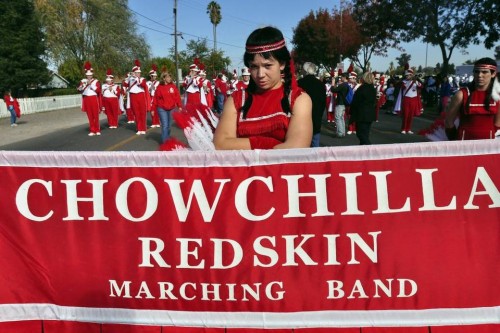
By Shawn Jansen, Merced Sun-Star
Public schools in California would have to stop using the term “Redskins” for their sports teams or mascot if a bill is approved by state legislators.
Assembly Bill 30, authored by Assemblyman Luis Alejo, D-Watsonville, would prohibit schools from using the name beginning Jan. 1, 2017. If the legislation becomes law, California would become the first state to ban the use of Redskins for public schools.
The Assembly Committee on Arts, Entertainment, Sports, Tourism and Internet Media and the Education Committee have approved the bill. It now heads to the Appropriations Committee before it can go before the full Assembly and then the Senate.
The four high schools in California that still use Redskins as their mascot are Chowchilla in Madera County, Gustine in Merced County, Calaveras in Calaveras County and Tulare Western in Tulare County.
“We’ve been down this road since, I believe, 1996,” said Calaveras Unified School District Superintendent Mark Campbell. “This bill seems to have a better chance to pass.
“I don’t pretend to think some people aren’t offended by the use of Redskins. We understand that and if we have to make a change, we will. Our community doesn’t want it, our Native American community doesn’t want it, but if we have to, we’ll make the change,” Campbell said.
If forced to make the change, Chowchilla and Gustine won’t be as willing.
“We don’t call those offended by the term Redskins, Redskins. We call ourselves Redskins,” said Chowchilla Union High School District Superintendent Ron Seals. “We use the term as a sense of pride, respect and honor. We don’t use it in a derogatory way.
“It’s been our school mascot since the (1920s). In the fall, we’re going to celebrate our 100-year celebration. We are a one-high school town. We’re a small community with lots of alumni and generations of Redskins,” Seals said.
To help offset cost issues, the California Racial Mascots Act would allow schools to continue using uniforms and other items bearing the term Redskins that were purchased before Jan. 1, 2017, if the school selects a new mascot and doesn’t buy new uniforms with the old nickname.
Schools would be able to replace up to 20 percent of uniforms with the old name until Jan. 1, 2019.
The costs of phasing out the name go far beyond uniforms for teams, cheerleaders and bands. There are gyms, scoreboards and other things on campus that would have to be changed.
“We did a study of the costs, and it will cost at least $110,000, and perhaps more,” Gustine Unified School District Superintendent Ronald Estes wrote in an e-mail. “I see this as a local control issue; district school boards should be able to make this type of decision based on local concerns and needs.”
Campbell estimates it would cost roughly $55,000 to $65,000 for Calaveras to eliminate the term Redskins from the school. Anticipating that eventually it would have to change, the school has been using Calaveras more than Redskins on projects around campus.
Estes, Gustine Principal John Petrone and the five GUSD board members signed a letter sent to Assemblyman Patrick O’Donnell, chairman of the Assembly Education Committee.
In the letter, they write: “We are certainly aware of the sensitivity behind the utilization of the Redskin name. We have heard from Native Americans who have expressed opinions on both sides of the argument. What we have and continue to state emphatically is that at no time in the nearly 80 years we have used the Redskin moniker have we disparaged Native Americans, or portrayed our mascot in a derogatory fashion.”
This isn’t the first time these schools have faced the possibility of making these changes. The use of Redskins as a mascot has been a heated debate, including the NFL’s Washington Redskins. This is the third time state lawmakers have tried to ban the use of Native American terms as nicknames or mascots.
In 2002, a bill calling for the ban of nicknames such as Indians, Braves and Chiefs was introduced but failed. In 2004, Jackie Goldberg, who was then an assemblywoman from Los Angeles, narrowed the bill to ban just Redskins. The bill was passed by the Legislature but vetoed by then-Gov. Arnold Schwarzenegger.
“There is obviously a lack of respect when we allow teams to brand themselves with racial slurs,” Alejo told the Los Angeles Times. “The R-word was once used to describe Native American scalps sold for bounty, and in today’s society it has become widely recognized as a racial slur.”
Like Estes, Seals feels those decisions should be made at the local level. He said school officials won’t have any discussions about a possible new nickname if and when a law is passed.
“I’m not traveling to Watsonville and calling the legislator a Redskin,” Seals said. “I’m not sitting in my district and telling him what he should do. So for him to sit in his district and tell me what to do in mine doesn’t sit well with me.”
